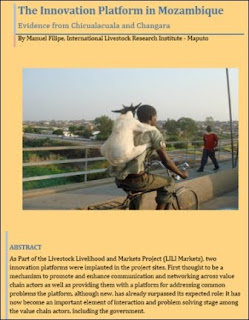| Goats awaiting sale at a market in Botswana. A new collaborative research project aims to improve smallholder livestock production and marketing in Botswana (photo credit: ILRI). |
The smallholder sector produces most of Botswana’s meat and over 70% of the country’s agricultural gross domestic product.
Although past policy and research have focused on the beef export sector, rather little information has been generated on the circumstances and potential of the 80,000 smallholders who own most of the country’s cattle, and the 100,000 households that earn livelihoods from sheep and goats.
This leaves strategies and investments for rural development and livelihood generation without a basis in data and analysis.
For both cattle and small ruminants, more competitive smallholder systems can improve livelihoods.
Several factors constrain the production and marketing of surpluses by smallholders: poor animal health is one example, that is often made worse by the complexities of communal grazing, and by limited access to services.
A new 3-year research project, Competitive smallholder livestock in Botswana, asks the following questions, and engages partners in research industry and government to help answer them:
- What are the characteristics of smallholder livestock producers in Botswana and what factors constrain their livelihoods?
- How can livestock-related marketing systems in Botswana be improved for the benefit of smallholders and the rural population?
The project has three objectives:
- To better define smallholder livestock production systems and to identify the factors affecting the productivity of smallholder livestock producers and assess their competitiveness
- To understand and improve conditions for market participation and value addition in markets for livestock, livestock products and inputs
- To strengthen the capacity of agricultural education and extension
The International Livestock Research Institute (ILRI) is collaborating in this project with the Botswana Institute for Development Policy Analysis and the Botswana Ministry of Agriculture.
The outcomes from the study will be improved and more sustainable livelihoods among smallholder livestock keepers, and increased uptake and use of scientific and economic knowledge by those providing services to smallholders.
The project is funded by the Australian Centre for International Agricultural Research (ACIAR) and runs from 1 September 2012 to 31 August 2015.
For more information, please contact Sirak Bahta (s.bahta @ cgiar.org)








